- Home
- Lissa Evans
V for Victory
V for Victory Read online
Lissa Evans
* * *
V FOR VICTORY
Contents
AUTUMN: 1944
SPRING: 1945
Acknowledgements
About the Author
Lissa Evans has written six novels, including the bestselling Old Baggage, Crooked Heart (longlisted for the Baileys Prize) and Their Finest Hour and a Half, which was filmed as Their Finest. Two of her books for children, Small Change for Stuart and Wed Wabbit, were shortlisted for the Carnegie Medal.
Also by Lissa Evans
NOVELS
Spencer’s List
Odd One Out
Their Finest Hour and a Half
(motion picture released as Their Finest)
Crooked Heart
Old Baggage
NOVELS FOR CHILDREN
Small Change for Stuart
Big Change for Stuart
Wed Wabbit
For my friends Georgia Garrett and Bill Scott-Kerr
Autumn
* * *
1944
Where T. Allerdyce, Textbooks & Stationery should have been, there was nothing but a flight of stairs, silhouetted against a white sky. The air was full of grit, the rubble seeded with ruined books, their pages snapping back and forth in the cold wind. Noel flipped open a cover with his foot, and saw an illustration of the human digestive system, its cross-sectioned owner breezily eating an apple, apparently unconcerned that his innards were exposed to the world.
The whole street had gone, a roped-off crater showing where the V-2 had actually landed, the shops and houses marked only by the odd truncated wall or empty door frame. The staircases alone had survived, some still with remnants of carpet, some spoked with broken bannisters. Noel was tempted to climb the nearest, and see the destruction from a height, but half the treads were missing.
The V-2 rockets had been dropping out of the sky for a couple of months now, though ‘dropping’ implied that you could see them descend, whereas they fell at such speed that no warnings were possible; a crack and a boom, and then death. ‘Like God clapping his hands,’ Vee had suggested, fancifully. Each one knocked the roofs off a quarter of a square mile of houses, and flattened those at the centre; ‘more like God stamping his foot,’ Noel had said.
They’d been lucky so far this year, at home in Hampstead; nothing but the occasional Heinkel unloading H.E.s, and a single doodlebug which had landed in a pond on the Heath and hurled a flood of green water over the bank and down the road, marbling the tarmac with waterweed and sending a dead duck surfing through the chemist’s door.
Noel let the book-cover fall. Last time he’d visited the shop, Mr Allerdyce had given him a cup of tea, and talked eloquently about his years as a teacher in Tonga. ‘The young ladies there – how can I describe them? They have flesh as firm as a Michelangelo marble, but when they dance, every part of them vibrates …’ Noel had thought about this image quite a few times over the succeeding months and had rather been looking forward to continuing the conversation.
There was a sudden movement in the rubble, and a rat emerged from behind an angled pipe, a packet of semolina in its teeth. It caught sight of Noel, and froze, and he hopped off the mound of bricks (best not to think of its grave-like contour) and walked away. Perhaps, he thought, Mr Allerdyce had been asleep when the bomb fell; asleep and dreaming of Tonga.
At the end of the road, a church had escaped the worst of the blast, though half the roof had fallen in, and the windows were empty. In the road beside it, glass crunched underfoot, a million splinters of indeterminate colour and occasional larger pieces, red and blue, a glimpse of a gesturing arm, a broken halo – and there, upright in the gutter, an unbroken rectangle of amber glass the size of Noel’s palm, still edged with lead. He held it up to one eye and looked along the road, and the V-2 devastation was transformed into something much older, a sepia photograph from one of Mattie’s books, Pompeii emerging from the ash. And between the excavated walls, a short, rounded figure, purposefully approaching. Noel slipped the glass into his pocket.
It was a lady ARP warden, two white stripes on the sleeve of her tunic, her boots filthy with beige dust, the legs of her slacks rolled several times above the ankle.
‘Were you looking for something?’ she asked, her tone brisk.
‘I was,’ said Noel. ‘I had a list of books to buy at Mr Allerdyce’s shop. Geography and History, mainly.’
‘Oh dear. Well, you’re out of luck, I’m afraid. You’d better cut along – half these walls are unsafe.’
‘What happened to Mr Allerdyce? Is he still alive?’
‘Yes,’ she said, unexpectedly. ‘He was in his basement, reading a book.’
‘Which book?’
Her official expression eased and she almost smiled. ‘I can’t tell you, but it had a red cover – he was still clutching it when we got him out.’ She looked back at the empty street, as if still unable to believe that anyone had survived. ‘So where are you at school?’
‘I’m not. I have tutors.’
‘What – tutors in the plural?’ She looked sceptical.
‘Yes, actually.’ There was a pause. ‘It’s not as grand as it sounds, they’re just our lodgers. They teach me according to the areas of their expertise.’
‘How old are you?’
‘Fourteen. Nearly fifteen.’
‘You look younger, but you sound older. So go on—’ She glanced at her watch and then folded her arms, and shifted her weight more comfortably. She was quite young herself, with a pleasant, round face, and a frizz of brown hair beneath her beret. ‘What subjects are you studying?’
‘Well, Geography and History, obviously, though I’m tutoring myself in those at the moment, hence the textbooks. English and Latin from Mr Jepson, who’s a journalist. Mathematics and book-keeping from Mr Reddish – he’s a cashier – sciences from Dr Parry-Jones, French from Miss Appleby – though, to be honest, I don’t think she knows very much, only a few phrases like ‘your eyes are very lovely’ and ‘how much is the lipstick?’ – and cookery from Miss Zawadska, who’s a canteen supervisor. She’s also teaching me Polish.’
‘You’re pulling my leg.’
‘Dzien dobry. Mam na imiȩ Noel Bostock.’
She actually laughed this time. ‘You’re a tonic,’ she said. She checked her watch again. ‘Come and see something. It’s quite educational.’
There was a cardboard sign reading ‘DO NOT ENTER – DANGER!’ strung across the door of the church, but she opened it anyway. Light spilled into a broad porch; there were hymn-books stacked on a bench and a print of a girlish-looking St Francis feeding doves. ‘I think this part’s Victorian,’ said the warden, ‘but the vicar says the main structure’s far older. This was in the ceiling wreckage.’ She pulled away a fold of canvas from something lying on the floor. ‘It’s called a roof boss,’ she said. ‘We think it’s not seen daylight for centuries.’ Noel crouched down. A wooden face the size of his own looked back at him, green vines pouring out of each side of the open mouth and encircling the head. He leaned back so that his shadow no longer fell across the carving, and the colours leaped out: the eyes pure white, a blue dot at the centre of each, the flared nostrils lined with red. It was as brilliant as if the brush had just been laid down – brighter, newer, than anything he’d seen for years, in this tired city where everything looked in need of a scrub or a lick of paint, or a wrecking-ball.
‘What’s going to happen to it?’
‘Someone’s coming from the University to take a look,’ said the warden. ‘There might be more in the rubble, the vicar thinks.’
‘Will it go to a museum?’
‘I suppose it might.’
‘Which one? The V&A? I go there quite often.’
‘Tell you what,’ said the warden, taking a small notebook and a stub of pencil from her pocket and handing it to Noel, ‘scribble your name and address down here and I’ll drop you a card if I find out. Whatever happens, I hope they take it soon or it’ll end up getting swiped – people will loot anything, you’d be amazed.’ She pulled the canvas back across and Noel furtively patted his pocket to make sure he still had the glass.
Outside, the sky had darkened.
‘Oh,’ said Noel, tilting his head.
‘What’s the matter?’ The warden turned from the door, and then heard it herself.
‘Doodlebug.’
The faint clatter, like a stick dragged along an iron fence, was coming from the south-east.
‘I thought we’d finished with those buggers,’ she said. ‘Pardon my Polish. Come along – there’s a shelter on Cheshunt Road.’
Noel followed her, craning upwards as he walked. The ugly rattle grew louder and the V-1 came into view, far overhead, its silhouette as prosaic as a piece of drainpipe.
‘It’s going over,’ said the warden, slowing her steps. ‘Heading towards Finchley, I’d say, or Hampstead.’
A cold hand seemed to grip the back of Noel’s neck. ‘Hampstead’s where I live.’
She gave him a quick, appraising glance. ‘It’ll probably go even further,’ she said. ‘It might end up missing London altogether.’
‘All the same, I’d better get back to my aunt. Goodbye, and thank you for showing me the roof boss.’ The last words were over his shoulder; he was already heading for the Tube, half running, a thread of panic reeling him in. Was Vee at home this afternoon? No, he remembered, she was at her Thursday knitting circle – in which case, was she anywhere near an adequate shelter? He could hear the V-1 grinding into the distance, the engine still running – a deadly clockwork toy, wound up fifty miles away and chugging to a random end somewhere in the suburbs.
And as he jogged past the rubble dunes, the same old vision came sliding into his head, the final image of a recurring dream from which he regularly woke with a gasp: of himself sitting up in bed and looking out through a missing wall at a dawn sky, and realizing that the house had been bisected and that he was alone, poised on the edge of a vast, sandy crater.
‘Hoi!’
He turned and saw the warden waving the notebook in which he’d written his address. She shouted something else – ‘No’, or ‘I know!’ – and beckoned, but he shook his head and hurried onwards.
‘Biscuit, Mrs Overs?’
Vee peered into the tin and selected the last remaining custard cream. It disintegrated almost as soon as her teeth touched it, filling her mouth with crumbs and snowing a fine dust on to the half-knitted sock in her lap. She swallowed with difficulty, and washed the sludge down with tea.
‘I’ve heard that Peek Freans have changed their recipes,’ said Mrs Lunn, gingerly taking a digestive, ‘they’ve reduced the amount of shortening. They can’t get the lard any more.’
Mrs Claxton nodded. ‘I’ve heard that they’re using chicken fat instead of lard. How are your chickens, Mrs Overs?’
‘Doing quite nicely, thank you,’ said Vee. ‘I’m thinking of getting another White Leghorn.’
‘Laying regularly, are they?’
‘Most of them, yes.’
‘Of course, if they don’t lay, then they’re just an expense, aren’t they? I expect you have to decide whether to hold on to those that don’t lay.’
‘That’s right.’
‘Or whether they’d be better off in the oven.’
Mrs Claxton waited for a moment, her bright little gaze poking Vee all over like a skewer. Vee smiled blandly. There were indeed two chickens over which the axe was currently hovering, but neither of them was going to end up on Mrs Claxton’s table. One was earmarked for the elderly gas engineer on Frogmore Lane who nursed Vee’s bathroom geyser from crisis to crisis, like a family doctor with a consumptive heiress, and the other for Noel’s birthday. He liked a bit of roast chicken, though he’d mentioned he’d found a recipe for a wild-garlic-and-celery stuffing in the newspaper and she was going to have to put her foot down about that; she had the lodgers to consider. The card that she kept permanently in the newsagent’s window mentioned ‘good, plain cooking’, as well as ‘comfortable, spacious accommodation’, and she didn’t want someone leaving because Green Shutters smelled like a French back-alley. She’d already lost Mr Purbisson in the last month, though admittedly that was because of the V-2s rather than the food – he’d gone back to his sister in Gloucester, his nerves in shreds, which meant that Noel was now short of a Geography teacher, and the next time she interviewed a lodger she’d have to find out not only if they could meet the rent, but how much they knew about alluvial plains. Or perhaps she could persuade Mr Jepson to extend his range of subjects in return for a reduction in his bill. ‘Or you could just go to a school,’ she’d suggested to Noel, trying to make it sound light-hearted yet plausible, and he’d said, ‘I’d rather clean Hitler’s WC,’ and had carried on making the sausage-meat fricassee that he always cooked on Thursdays. He’d followed it up with a steamed blackberry pudding that Miss Zawadska had announced was ‘professional qvality’, and Noel had flushed very slightly, which was the equivalent of an ordinary fourteen-year-old running round in circles punching the air.
‘I saw your nephew up on the Heath yesterday,’ said Mrs Lunn, who in between running the Methodist Soldiers’ Comforts Knitting Circle and bringing up two daughters the size of carthorses had apparently learned to read minds. ‘He was sitting on a bench with a book next to a young girl with plaits, and she was reading as well. From a different book,’ she added, quickly, as if to absolve the scene of any indelicacy.
‘She’s the grand-daughter of one of my neighbours,’ said Vee. ‘Major Lumb.’
‘Ooh, Major,’ said Mrs Arnold, who liked a title.
‘She goes to a boarding school, but they’re on half-term and her parents are in Malta. Her father’s an admiral.’
‘Ooh, Admiral.’
Vee picked up her half-completed sock again, and the other women followed her lead, Mrs Lunn working at twice the speed of the rest, her face placid, her fingers a blur, as if there was an ‘on’ switch just below her elbows. Vee herself was an indifferent knitter, unable to maintain the correct tension, so that her balaclavas had necks as wide as the head, and face-holes that encircled the features like a snare; she couldn’t imagine her efforts shortening the war by more than a second or two, and it certainly wasn’t the quality of the conversation that brought her to the circle (Mrs Rice was already resuming her account of her daughter’s wedding, an event that had taken place eight years ago). No, what kept her coming – and at least she was honest enough to admit it to herself – was the slight deference that she received from its members. In her role as Margery Overs, living in a very large house on the Heath, with distinguished neighbours, a lodger who worked at the BBC, and room for twelve chickens, she was somebody whose opinions were both sought and listened to. This was not something that had ever happened to her before. ‘Oh, Mrs Overs, we missed you,’ they said, when she’d skipped a week. ‘Mrs Overs says that Alvar Liddell always has a mug of cocoa before he reads the news,’ she’d heard Mrs Rice reporting, breathlessly.
By contrast, her actual neighbours in the Vale of Health were a snooty bunch who seemed to consider that she’d dragged down the whole tone of the road by opening a boarding house. Sometimes she was tempted to hang the washing out of the window, just to annoy them.
‘And my sister-in-law,’ continued Mrs Rice, ‘that’s the one who’s married to my brother, not my husband’s sister, who couldn’t come because of her phlebitis – my sister-in-law—’
‘Hark!’ said Vee, lifting her head; the tiny, wicked noise was like a distant dentist’s drill.
Mrs Rice paused with her mouth open and Mrs Arnold said, ‘Oh no, oh no …’ and the sound of the doodlebug grew from a far-off buzz to a nasty overhead roar, and the
n, abruptly, stopped.
Mrs Arnold got under the table first. They were in the verger’s room at the chapel, a plywood lean-to about as substantial as a bed-sheet over a line, but the table was two-inch oak and there were suddenly seven of them beneath it, including Mrs Aldermayer, who couldn’t normally stand up without two people helping. Mrs Lunn was saying the Lord’s Prayer and Vee was counting in her head because Noel had told her that the average length of time between the engine cutting out and the flying bomb actually hitting the ground was twelve seconds, but she’d only got as far as ‘eight Mesopotamia’ when the bomb hit.
There was a tremendous bang, the windows went and something hit the tabletop with a smash.
Mrs Arnold screamed.
‘Lampshade,’ said Vee, as pale pink shards pattered to the floor.
‘Well, if that’s all,’ said Mrs Rice, shakily. ‘Where did that go down, do you think? Rosslyn Hill?’
‘I’ll go and find out, shall I?’ said Vee, unfolding herself. As she picked her way through the glass she heard Mrs Arnold say, ‘I wish I could be as calm as Mrs Overs,’ and Mrs Rice replying, ‘Well, she’s been through it and out the other side, hasn’t she?’ and involuntarily, Vee raised a hand and stroked the scar that ran in a curve beneath her right cheekbone. It was true, in a way; she’d been under one bomb, and she knew, with inexplicable but absolute certainty, that she wouldn’t be under another – she’d have bet a hundred pounds on it, if she’d had a hundred pounds. One of her lodgers, Mr Reddish, had sailed through the Great War without a scratch, and he’d told her that he’d known from the start that he wouldn’t get touched, though he could never sleep afterwards for thinking of all the chums who’d gone west. Vee, too, often woke before dawn and watched the clock, though it wasn’t bombs she was worrying about.

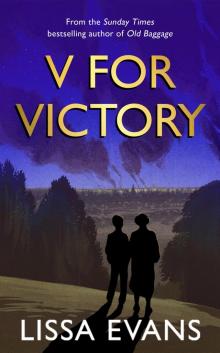 V for Victory
V for Victory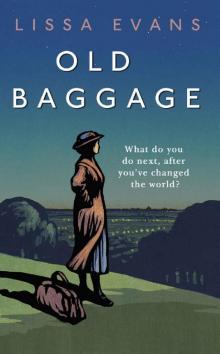 Old Baggage
Old Baggage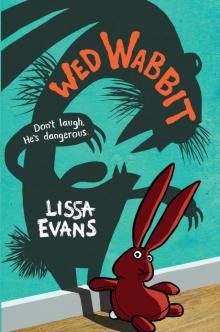 Wed Wabbit
Wed Wabbit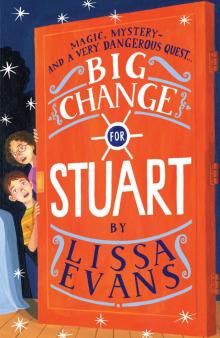 Big Change for Stuart
Big Change for Stuart Spencer's List
Spencer's List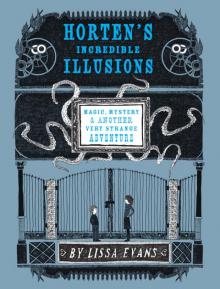 Horten's Incredible Illusions
Horten's Incredible Illusions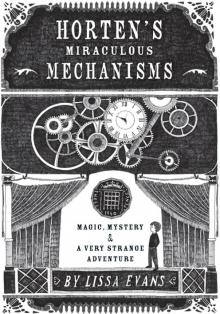 Horten's Miraculous Mechanisms
Horten's Miraculous Mechanisms Their Finest Hour and a Half
Their Finest Hour and a Half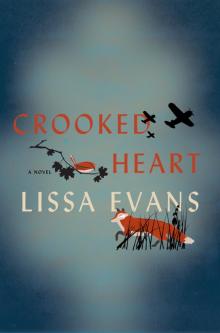 Crooked Heart
Crooked Heart